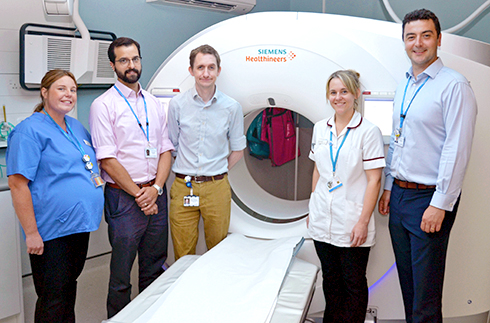Media Release
Date: 22 July 2019
Cutting-edge radiology technology used to treat chest pain patients at the RUH
The latest in medical technology is being used at the Royal United Hospitals Bath NHS Foundation Trust (RUH) to help quickly and efficiently diagnose patients at risk from obstructive coronary disease.
The cutting-edge technology means that many patients being checked for a narrowing of their coronary arteries - something which can lead to angina and heart attack - may no longer need to undergo additional stress testing or even an invasive procedure.

The RUH has one of the latest CT scanners that allows radiologists to capture motion free images of the heart and its blood vessels in a single heartbeat.
If the scan shows signs of coronary heart disease it may be sent to HeartFlow, a company in the US, where it is analysed using computation fluid dynamic algorithms. The results are then returned to the RUH within just six hours in the form of a computer-generated 3D model, clearly illustrating if the arteries have potentially flow-limiting narrowing and where.
Patients showing signs of obstructive coronary disease go forward to have 'revascularisation', through the introduction of a stent by cardiologists or a coronary bypass operation by cardiac surgeons.
Where no flow-limiting narrowing of the arteries is found, patients don't have to undergo any further tests and invasive procedures as they would have in the past, and instead their condition can usually be managed with lifestyle advice and medications.
Consultant Radiologist, Dr Ben Hudson, said: "We've had nearly 300 patients use the new technology. It means that we are able to diagnose potential obstructive coronary disease earlier, and those patients that do not have a narrowing of their arteries no longer have to go through any unnecessary and invasive tests.
"The HeartFlow analysis also helps us to determine whether or not the insertion of stents or surgical bypass is likely to relieve symptoms and improve a patient's longer-term outcomes."
Consultant Radiologist, Dr. Jonathan Rodrigues, added: "Heart disease remains the biggest killer in the UK. This new technology helps us work closely with our cardiology and cardiac surgical colleagues to identify upfront the best treatment for each individual patient."
The HeartFlow Analysis tool was introduced at the RUH after a successful bid to NHS England for an Innovation and Technology Payment, which helps to fund innovative medical devices, diagnostics and digital products. HearftFlow Analysis is being used on a trial basis until April 2020.
ENDS
Notes to Editor
- The Royal United Hospitals Bath NHS Foundation Trust provides acute treatment and care for a catchment population of around 500,000 people in Bath, and the surrounding towns and villages in North East Somerset and Western Wiltshire. The hospital provides healthcare to the population served by four Clinical Commissioning Groups: Bath & North East Somerset CCG, Wiltshire CCG, Somerset CCG and South Gloucestershire CCG.
- The Trust has 759 beds and a comprehensive range of acute services including medicine and surgery, services for women and children, accident and emergency services, and diagnostic and clinical support services.
- In 2015 The Royal United Hospitals NHS Foundation Trust acquired the Royal National Hospital for Rheumatic Diseases (RNHRD) NHS Foundation Trust. The RNHRD treats patients from across the country offering services in rheumatology, chronic pain, chronic fatigue syndrome/ME, cancer related fatigue and fatigue linked to other long term conditions such as multiple sclerosis.
- The RUH is changing - we have an exciting programme of redevelopment underway transforming our site and further improving the services we provide. The Trust is building a purpose built RNHRD and Therapies Centre and is now working towards a new Dyson Cancer Centre. For more details visit: www.ruh.nhs.uk/fit4future

